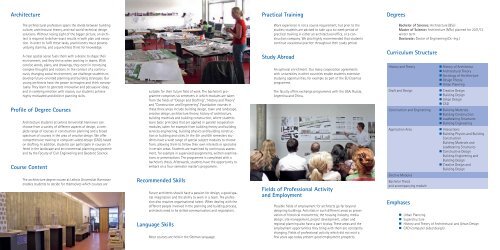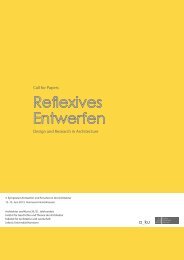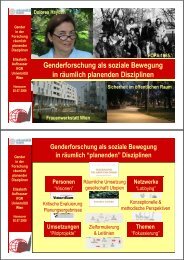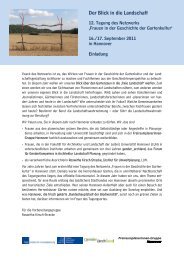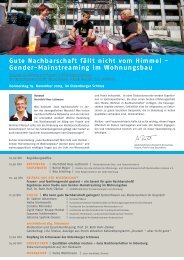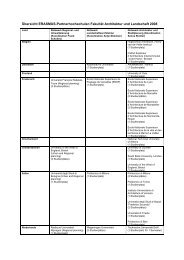Architecture B.Sc. - Leibniz Universität Hannover
Architecture B.Sc. - Leibniz Universität Hannover
Architecture B.Sc. - Leibniz Universität Hannover
Create successful ePaper yourself
Turn your PDF publications into a flip-book with our unique Google optimized e-Paper software.
<strong>Architecture</strong>Practical TrainingDegreesThe architectural profession spans the divide between buildingculture, architectural theory, and real world technical designsolutions. Without losing sight of the bigger picture, an architectis required to deliver exact results in both plan and execution.In order to fulfil these tasks, practitioners must possessundying stamina, and a quenchless thirst for knowledge.A clear spatial sense fuels them with a desire to shape theirenvironment, and they thrive when working in teams. Withconcise words, plans, and drawings, they excel in conveyingcomplex thoughts and notions. In the context of a continuouslychanging social environment, we challenge students todevelop future-oriented planning and building strategies. Ouryoung architects have the power to imagine and think conceptually.They learn to generate innovative and persuasive ideas,and in combing emotion with reason, our students achievehighly motivated and distinct planning skills.Profile of Degree Courses<strong>Architecture</strong> students at <strong>Leibniz</strong> Universität <strong>Hannover</strong> canchoose from a variety of different aspects of design, a completerange of courses in construction planning and a broadspectrum of courses in the area of creative design. We offercomprehensive training in computer-aided design (CAD), basedon drafting. In addition, students can participate in courses offeredin the landscape and environmental planning programmeand by the Faculty of Civil Engineering and Geodetic <strong>Sc</strong>ience.Course Contentsuitable for their future field of work. The bachelor’s programmecomprises six semesters in which modules are takenfrom the fields of “Design and Drafting”, “History and Theory”and “Construction and Engineering”. Foundation courses inthese three areas include building design, town and landscape,creative design, architecture theory, history of architecture,building materials and building construction, where studentslearn basic principles that are applied in parallel cooperationmodules, taken for example from building theory and buildingservices engineering, building physics and building constructionor building and cities. In the 5th and 6th semesters studentshave a wide range of special subject modules to choosefrom, allowing them to follow their own interests or specialisein certain areas. Students are examined by continuous assessment,for example in supervised assignments, written examinationsor presentations. The programme is completed with abachelor’s thesis. Afterwards, students have the opportunity toembark on a four-semester master’s programme.Work experience is not a course requirement, but prior to thestudies; students are advised to take up a six week period ofpractical training in either an architectural office, or a constructioncompany. We also highly recommended that studentscontinue vocational practice throughout their study period.Study AbroadAn optional enrichment. Our many cooperation agreementswith universities in other countries enable students extensivestudying opportunities, for example as part of the EU Erasmusprogramme.The faculty offers exchange programmes with the USA, Russia,Argentina and China.Bachelor of <strong>Sc</strong>ience: <strong>Architecture</strong> (B<strong>Sc</strong>)Master of <strong>Sc</strong>ience: <strong>Architecture</strong> (M<strong>Sc</strong>) planned for 2011/12winter termDoctorate: Doctor of Engineering (Dr.-Ing.)Curriculum StructureHistory and TheoryDraft and DesignConstruction and EngineeringApplication Area• History of Architectur• Architectural Theory• Sociology of <strong>Architecture</strong>• Design Theory• Urban Planning• Creative Design• Building Design• Urban Design• CAD• Building Materials• Building Construction• Loadbearing Structures• Building Engineering• Interactions• Building Physics and BuildingConstructionBuilding Materials andLoadbearing Structures• Constructive DesignBuilding Engineering andBuilding Design• Creative Design andBuilding DesignThe architecture degree course at <strong>Leibniz</strong> Universität <strong>Hannover</strong>enables students to decide for themselves which courses areRecommended SkillsFuture architects should have a passion for design, a good spatialimagination and the ability to work in a team. The professionalso requires organisational talent. When dealing with thedifferent people involved in the planning and building process,architects need to be skilled communicators and negotiators.Language SkillsMost courses are held in the German language.Fields of Professional Activityand EmploymentPossible fields of employment for architects go far beyonddesigning buildings. Activities in such different areas as preservationof historical monuments, the housing industry, mediadesign, site management, project development, urban andregional planning also have a part to play. These areas and theemployment opportunities they bring with them are constantlychanging. Fields of professional activity which did not exist afew years ago today present good employment prospects.Elective ModulesBachelor Thesisand accompanying moduleEmphases• Urban Planning• Superstructure• History and Theory of Architectural and Urban Design• CAD (computer aided design)


